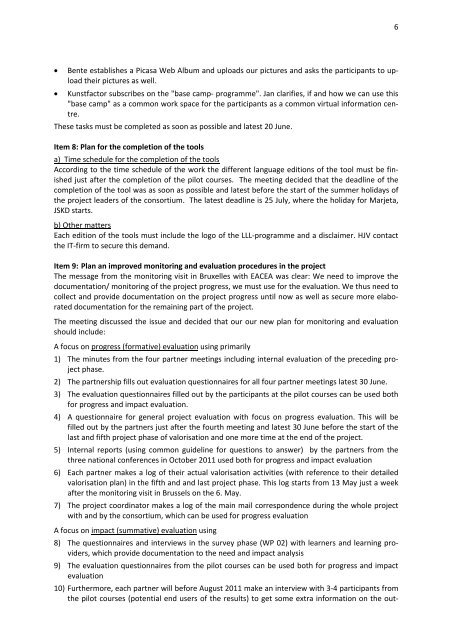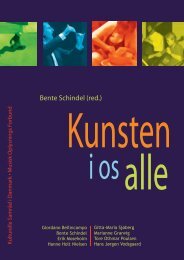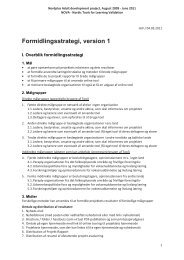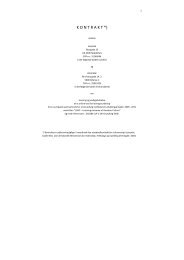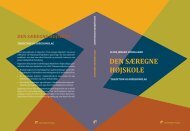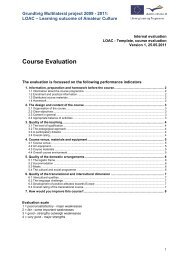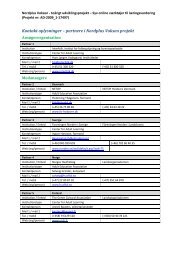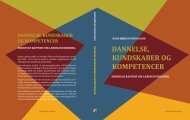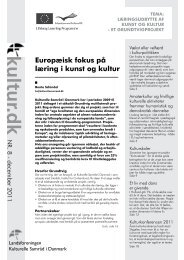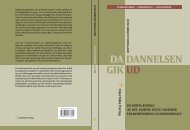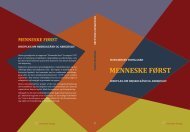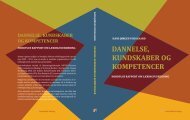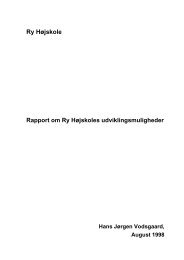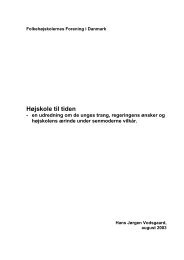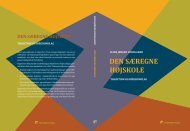Read here the Minutes from the fourth partner meeting.
Read here the Minutes from the fourth partner meeting.
Read here the Minutes from the fourth partner meeting.
You also want an ePaper? Increase the reach of your titles
YUMPU automatically turns print PDFs into web optimized ePapers that Google loves.
6<br />
<br />
Bente establishes a Picasa Web Album and uploads our pictures and asks <strong>the</strong> participants to upload<br />
<strong>the</strong>ir pictures as well.<br />
Kunstfactor subscribes on <strong>the</strong> "base camp‐ programme". Jan clarifies, if and how we can use this<br />
"base camp" as a common work space for <strong>the</strong> participants as a common virtual information centre.<br />
These tasks must be completed as soon as possible and latest 20 June.<br />
Item 8: Plan for <strong>the</strong> completion of <strong>the</strong> tools<br />
a) Time schedule for <strong>the</strong> completion of <strong>the</strong> tools<br />
According to <strong>the</strong> time schedule of <strong>the</strong> work <strong>the</strong> different language editions of <strong>the</strong> tool must be finished<br />
just after <strong>the</strong> completion of <strong>the</strong> pilot courses. The <strong>meeting</strong> decided that <strong>the</strong> deadline of <strong>the</strong><br />
completion of <strong>the</strong> tool was as soon as possible and latest before <strong>the</strong> start of <strong>the</strong> summer holidays of<br />
<strong>the</strong> project leaders of <strong>the</strong> consortium. The latest deadline is 25 July, w<strong>here</strong> <strong>the</strong> holiday for Marjeta,<br />
JSKD starts.<br />
b) O<strong>the</strong>r matters<br />
Each edition of <strong>the</strong> tools must include <strong>the</strong> logo of <strong>the</strong> LLL‐programme and a disclaimer. HJV contact<br />
<strong>the</strong> IT‐firm to secure this demand.<br />
Item 9: Plan an improved monitoring and evaluation procedures in <strong>the</strong> project<br />
The message <strong>from</strong> <strong>the</strong> monitoring visit in Bruxelles with EACEA was clear: We need to improve <strong>the</strong><br />
documentation/ monitoring of <strong>the</strong> project progress, we must use for <strong>the</strong> evaluation. We thus need to<br />
collect and provide documentation on <strong>the</strong> project progress until now as well as secure more elaborated<br />
documentation for <strong>the</strong> remaining part of <strong>the</strong> project.<br />
The <strong>meeting</strong> discussed <strong>the</strong> issue and decided that our our new plan for monitoring and evaluation<br />
should include:<br />
A focus on progress (formative) evaluation using primarily<br />
1) The minutes <strong>from</strong> <strong>the</strong> four <strong>partner</strong> <strong>meeting</strong>s including internal evaluation of <strong>the</strong> preceding project<br />
phase.<br />
2) The <strong>partner</strong>ship fills out evaluation questionnaires for all four <strong>partner</strong> <strong>meeting</strong>s latest 30 June.<br />
3) The evaluation questionnaires filled out by <strong>the</strong> participants at <strong>the</strong> pilot courses can be used both<br />
for progress and impact evaluation.<br />
4) A questionnaire for general project evaluation with focus on progress evaluation. This will be<br />
filled out by <strong>the</strong> <strong>partner</strong>s just after <strong>the</strong> <strong>fourth</strong> <strong>meeting</strong> and latest 30 June before <strong>the</strong> start of <strong>the</strong><br />
last and fifth project phase of valorisation and one more time at <strong>the</strong> end of <strong>the</strong> project.<br />
5) Internal reports (using common guideline for questions to answer) by <strong>the</strong> <strong>partner</strong>s <strong>from</strong> <strong>the</strong><br />
three national conferences in October 2011 used both for progress and impact evaluation<br />
6) Each <strong>partner</strong> makes a log of <strong>the</strong>ir actual valorisation activities (with reference to <strong>the</strong>ir detailed<br />
valorisation plan) in <strong>the</strong> fifth and and last project phase. This log starts <strong>from</strong> 13 May just a week<br />
after <strong>the</strong> monitoring visit in Brussels on <strong>the</strong> 6. May.<br />
7) The project coordinator makes a log of <strong>the</strong> main mail correspondence during <strong>the</strong> whole project<br />
with and by <strong>the</strong> consortium, which can be used for progress evaluation<br />
A focus on impact (summative) evaluation using<br />
8) The questionnaires and interviews in <strong>the</strong> survey phase (WP 02) with learners and learning providers,<br />
which provide documentation to <strong>the</strong> need and impact analysis<br />
9) The evaluation questionnaires <strong>from</strong> <strong>the</strong> pilot courses can be used both for progress and impact<br />
evaluation<br />
10) Fur<strong>the</strong>rmore, each <strong>partner</strong> will before August 2011 make an interview with 3‐4 participants <strong>from</strong><br />
<strong>the</strong> pilot courses (potential end users of <strong>the</strong> results) to get some extra information on <strong>the</strong> out‐


